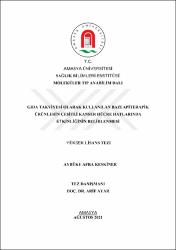Gıda takviyesi olarak kullanılan bazı apiterapik ürünlerin çeşitli kanser hücre hatlarında etkinliğinin belirlenmesi

View/
xmlui.dri2xhtml.METS-1.0.item-rights
info:eu-repo/semantics/openAccessDate
2021Metadata
Show full item recordAbstract
Gıdaların doğal yollardan hastalıkların önlenmesi ve tedavisindeki etkinliğinin bilimsel olarak ortaya konulması sağlığımızın korunmasında beslenme desteğinin önemini arttırmaktadır. Bu sebeple gıda takviyeleri daha fazla tüketilir hale gelmiştir. Bu tez çalışmasında; MCF-7 (insan meme adenokarsinoma), HT-29 (insan kolorektal adenokarsinoma) ve DLD-1 (insan kolon adenokarsinoma) kanser hücre hatlarında antikanserojenik etki göstereceği düşünülen gıda takviyesi olarak kullanılan liyofilize apilarnilin ve ana arı larvasının sitotoksik etkilerinin araştırılması amaçlanmıştır. Bu nedenle hücre proliferasyonunu engelleyici olduğu düşünülen gıda takviyesi olarak kullanımı artan apilarnil ve ana arı larvasının in vitro çalışılması planlanmıştır. MCF-7 (insan meme adenokarsinoma), HT-29 (insan kolorektal adenokarsinoma) ve DLD-1 (insan kolon adenokarsinoma) kanser hücre hatlarında, apilarnilin ve ana arı larvasının sitotoksik dozu ve IC50 değeri MTT yöntemi ile tespit edilmiştir. Çalışmadan elde edilen bulguların değerlendirilmesi ile kanserli hastaların tedavi sürecinde yaşadığı olumsuzluklar ve ilaçların yarattığı güçlü yan etkiler düşünüldüğünde, antioksidan ve antikanserojen etkisi olan gıda takviyelerinin geliştirilmesi ve kullanılması önem arzetmektedir. Bu çalışmamız literatüre, kanser hastaları arasında gıda takviyelerinin kullanımındaki artış nedeniyle, apilarnil ve ana arı larvası gibi son zamanlardaki popüler arı ürünlerinin geniş çaplı çalışmalarla insan sağlığı üzerine etkisi ve sağlık profesyonellerinin bu konuda hastalarını bilinçlendirmesi için önemli katkı sağlayacağı düşünülmektedir. Scientifically demonstrating the effectiveness of foods in the prevention and treatment of diseases in natural ways increases the importance of nutritional support in the protection of our health. For this reason, food supplements have become more consumed. In this study; It was aimed to investigate the cytotoxic effects of lyophilized apilarnil and queen bee larvae, which are used as food supplements and also thought to have anticarcinogenic effects on MCF-7 (human breast adenocarcinoma), HT-29 (human colorectal adenocarcinoma) and DLD-1 (human colon adenocarcinoma) cancer cell lines. Moreover, apilarnil and queen bee larvae are thought to inhibit cell proliferation. Therefore, in vitro study of apilarnil and queen bee larvae were chosen among the food suplements. In MCF-7 (human breast adenocarcinoma), HT-29 (human colorectal adenocarcinoma) and DLD-1 (human colon adenocarcinoma) cancer cell lines, the cytotoxic dose and IC50 value of apilarnil and queen bee larvae were determined by MTT method. Considering the findings obtained from the study and the negative effects experienced by cancer patients during the treatment process and the strong side effects caused by drugs, it is important to develop and use food supplements with antioxidant and anticarcinogenic effects. It's thought that this study will contribute to the literature, due to the increase in the use of food supplements among cancer patients, the effect of recently popular bee products such as apilarnil and queen bee larvae on human health with large-scale studies and health professionals to raise awareness of their patients on this issue.
URI
https://tez.yok.gov.tr/UlusalTezMerkezi/TezGoster?key=tqUiYt63sTQLTpozMJ92Qt_43OcSNd5FHlwUpWhMTFSE9hQgUdtOMdB6yRlEMyfqhttps://hdl.handle.net/20.500.12450/1983
Collections
- Tez Koleksiyonu [103]

















